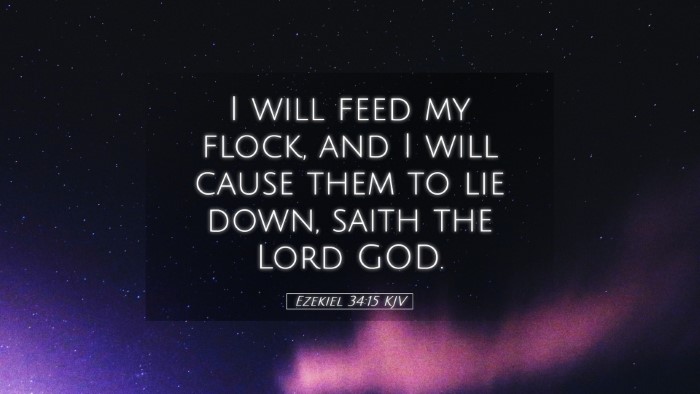Ezekiel 34:15 - A Commentary
Verse (Ezekiel 34:15): "I will feed my flock, and I will cause them to lie down, saith the Lord God." This verse emerges within a critical passage in Ezekiel where the Lord addresses the failures of Israel's leaders and His promise to take direct responsibility for His people.
Contextual Overview
The prophet Ezekiel speaks during a time of profound national crisis for Israel. The people are in exile, suffering the consequences of their kings’ and leaders’ transgressions. Here, God conveys His intention to be the true shepherd, contrasting Himself with the negligent rulers who failed to care for their flocks.
Commentary Insights
1. Divine Shepherdship
Matthew Henry emphasizes the role of God as the ultimate Shepherd. "I will feed my flock" signifies not only physical sustenance but also spiritual nourishment. The Lord's commitment indicates a personal involvement with His people, assuring them of His guidance and provision.
2. Promises of Care
Albert Barnes points out that the phrase "I will cause them to lie down" reflects tranquility and peace. The Good Shepherd provides a safe environment where His flock can rest—symbolizing security and absence of fear. This promise is pivotal as it reassures the exiled Israelites of restoration and peace amidst their turmoil.
3. Theological Implications
Adam Clarke notes the profound theological implications of God’s declarations. This verse illustrates God’s pastoral love, supporting the understanding of divine benevolence. The implications for the New Testament fulfillment are significant; Jesus, referring to Himself as the Good Shepherd (John 10:11), embodies this promise and extends it to a broader audience—inviting all to experience His pastoral care.
The Role of Leadership
Both Barnes and Henry underscore the contrast between God's leadership and that of Israel's past rulers. The leaders have been characterized as selfish, feeding themselves rather than their sheep. This lays a foundation for evaluating spiritual leaders today against the model of Christ, who embodies selflessness and dedication.
1. Accountability
The failure of the leaders points to an important theme of accountability. Barnes argues that spiritual leaders must recognize their responsibility to serve their communities diligently. The Lord's promise here serves as both a warning and encouragement to modern leaders about the weight of their calling.
2. Restitution and Redemption
In the context of exile, God's promise of feeding and leading His flock serves as a vision of restitution. Clarke elaborates that the restoration of the people symbolizes redemption, bringing hope that is crucial for those who feel abandoned.
Pastoral Application
This verse contains rich insights for pastors and theologians alike.
- Understanding God’s Role: Leaders must emulate God’s attributes: being attentive, nurturing, and protective over their congregations.
- Cultivating Restful Environments: Pastors need to facilitate spaces where individuals can experience God’s peace and rest, akin to the assurance offered in this verse.
- Redemptive Leadership: The call for leaders is to operate with a redemptive mindset, seeing their role in the broader context of God’s redemptive narrative.
Conclusion
Ezekiel 34:15 embodies a profound theme of God’s shepherding nature—a comfort to believers in every era. This verse not only speaks to the immediate context of Israel’s struggles but also reaches forward in its fulfillment in Christ, who invites all to experience rest in Him. It is a vital reminder for pastors, leaders, and scholars to contemplate the depth of this divine promise and the obligations that come with spiritual leadership.


